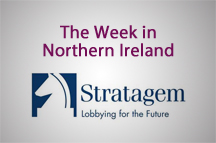Last week the United Kingdom voted to leave the European Union. The geographical variations are clear and unsurprising for the most part. Scotland voted overwhelmingly in favour of remaining – 62 per cent; to 38 per cent leave. In Wales, 52.5 per cent of voters chose to leave the EU, compared with 772,347 (47.5 per cent) supporting Remain. London and the large cities may have voted to remain but not enough people turned out to secure a different outcome.
Despite Northern Ireland as a whole favouring remain, 55.8 per cent to 44.2 per cent, a geographical ‘East/West’ split emerged with predominantly unionist constituencies (apart from North Down & Londonderry East) turning out in larger numbers to leave. On a turnout of 62.9 per cent, the local vote was the lowest turnout of all four nations.
Leading DUP members such as Sammy Wilson MP and Deputy Leader Nigel Dodds MP were vocal in favour of a Brexit. While Sinn Féin may not have pulled out all the stops to secure a remain vote, they were firmly for retaining NI's place in Europe alongside the Republic of Ireland.
Following the nationalist dictum that England's difficulty is Ireland's opportunity, Deputy First Minister Martin McGuinness repeated his (11 March 2016) call for a Border Poll in the case of a Brexit. This was firmly rejected by DUP leader and First Minister Arlene Foster who committed to ensuring Northern Ireland was front and centre of any negotiations with the EU, taking comfort from the Prime Minister's assurances that the devolved regions should be included within the forthcoming negotiations.
By Sunday, Martin McGuinness's focus moved from a Border Poll to securing the best deal for NI as part of any future negotiations. On the same day, the DUP's pro-exit Economy Minister Simon Hamilton promised to secure recognition of NI's specific circumstances. These circumstances go beyond conflict legacy issues to the fact that we are the only UK region to share a land border with the EU.
As things stand, the United Kingdom of Great Britain and Northern Ireland remains a member state of the European Union with all that implies. EU directives, regulations and obligations remain in place until a UK Prime Minister negotiates an exit agreement. What form any agreement will take cannot be pre-empted.
The reassuring words and £250bn from the Bank of England on Friday morning proved that at least Mark Carney had a plan. Reassurance from the NI Executive came by Monday afternoon when we were informed that special EU groups have been formed in each department with the Head of the Civil Service Malcolm McKibbin taking the lead.
Speaking this morning, the BBC NI Economics Editor John Campbell said that while the stock market can send important signals, “it’s a mug’s game to pay attention to the short term volatility of the markets.”
We are issuing the same health warning for all commentary and punditry over the next few days, weeks and, even months. Here across the Irish sea, we have a Programme for Government, Economic, Investment and Social Strategies in time for a December budget.
Distraction abounds as both the Conservatives and the Labour Party play out their particular psychodramas but now is the time for clear heads, steady nerves and strategic thinking as our political leaders recover from the shock and begin to focus on our future relationship with the 27 members of the EU.















